Тема: "Праздники в англоговорящих странах" (разработка урока по
учебнику М.З. Биболетовой)
Цели урока:
Учебный аспект: развитие речевых умений, активизация лексического материала.
Познавательный аспект: знакомство с традициями и обычаями англо-говорящих стран.
Воспитательный аспект: использовать речь, адекватную ситуации общения, осознание реалий иноязычной культуры.
Развивающий аспект:
развитие способности к сравнению,формулированию выводов из увиденного и услышанного;
развитие способности к выбору выражений, развитие коммуникабельности;
развитие умения аудировать с целью извлечения конкретной ситуации.
Оборудование: мультимедийный проектор, компьютеры.
Тип урока: изучение и закрепление новых знаний.
Форма урока: практикум (урок изучения нового материала)
Методы и приемы работы: коммуникативный
Объяснительно-демонстрационный.
Репродуктивный.
Фронтальный.
Индивидуальный
Характер заданий:
поисковый (работа с текстом)
репродуктивный (выполнение упражнений)
творческий (создание презентаций, решение кроссворда)
ХОД УРОКА
I. Оргмомент
– Glad to see you, students.Today we have an unusual lesson.So many guests have come to see your and my work.Today we’ll talk about holidays. I’m sure you know much about Russian and English holidays. We’ll read a text, do some exercises, listen to the tape and solve a crossword.
The slogan of our lesson is “So many countries , so many customs” Who can translate this proverb?
II. Фонетическая зарядка
First pay attention to the screen. How do we pronounce the word “holiday”?
Remember
[i]
Holiday, Sunday, Monday, Tuesday, Wednesday, Thursday, Friday, Saturday,Yesterday
[ei]
Day, Birthday, Today
Repeat the words after me.
III. Введение новых слов
useful expressions and wordsHOLIDAY
FESTIVAL – праздник
TO TAKE A HOLIDAY – взять отпуск, отдыхать
TO CELEBRATE – отмечать, праздновать
TO FEAST – пировать, праздновать
Translate the sentences into English
Обычно я беру отпуск летом.
Несколько дней назад мы праздновали международный женский день.
IV. Речевая зарядка
– Do you like holidays? Why?
What words are associated with the word “holiday”?
V. Знакомство с Британскими праздниками. Презентация (Приложение 1)
– Now we’ll get acquantance with the British holidays in detail. Let’ read every slide.
Christmas
On the 25th of December there is the greatest holiday of all in England – Christmas. People send X-mas cards to their friends and relatives. People buy a Christmas tree and decorate it with toys, coloured balls and lights.
Children wake up early to find stockings full of small presents on their bed.
New Year
New Year’s Eve all British celebrate on the 31st of December. Most people see with friends and relatives.
At midnight they sings New Year songs and wishes a happy New Year.
On the 14th of February there is St. Valentine’s Day. People send Valentine’s cards to someone they love. Usually they don’t sing them – you should guess who sent cards to you.
Mother’s day
In March there is a holiday for English women – Mother’s Day.
People in the family try to help her.
On that day they visit their mothers and give them presents and “A Mother’s Day Card”
St. Patrick’s day.
The 17th of March is a national holiday in Ireland – St. Patrick’s day. On that day people wear a shamrock. A shamrock is a plant with three leaves. It is the national symbol of Ireland.
St. Patrick was a man who had wonderful power. He cleared Ireland of snakes.
Easter
In April or at the end of March English people celebrate Easter Day. On Easter Sunday children get chocolate eggs and rabbits.
April Fool’s Day
April Fool’s Day is on the 1st of April. English children like this day very much. They play jokes and tricks on other people, even on teachers.
Father’s day
In June the English people celebrate Father’s Day.
On that day children send cards and give presents to their father’s.
In Great Britain children don’t go to school on the 1st of September.
They begin to study on the second Tuesday of September.
Halloween
On the 31st of October there is Halloween. The symbol of this holiday is “Jack o’lantern”. People make it from a pumpkin.
Children like Halloween parties, they put on witch’s and ghost’s dresses. They go “trick or treat”.
VI. Выполнение упражнений на основе текста
1. Look at the symbols of holidays. You should try to prove your suggestions briefly.
Предполагаемые ответы учащихся:
Right answers:
New Year – because the fur tree is the symbol of the New Year.
St. Valentine’s Day – because it is the day of love and a heart with an arrow is a symbol of this holiday.
Halloween – Jack-o-lantern is the symbol of this holiday.
Christmas – Santa Clause is the symbol of this holiday.
Easter – People dye eggs on Easter.
2. Insert the proper words concerning the theme " Holidays":
1) People ... May holiday.
decorate
celebrate
carry
2) People celebrate ... on the 31 of December.
New Year's Day
All Fools' Day
Victory Day
3) They ... New Year tree on that holiday.
dream
decorate
cut
4) People ... the old year out and the new year in
see
kick
catch
5) ... is the most popular holiday in Great Britain.
Easter
Christmas
May Day
6) In Great Britain eight public holidays are called ...
home holidays
office holidays
bank holidays
7) ... is a religious holiday.
Easter
Christmas
May Day
8) ... is the holidays of lovers.
May Day
St. Valentine’s Day
All Fools' Day
9) ... is the holiday of spring.
New Year's Day
All Fools' Day
May Day
10) People usually play jokes on their friends on ...
New Year's Day
Christmas
All Fools' Day
11) ... is a great holiday in Russia and other countries.
Victory Day
May Day
Easter
12) The ... is celebrated on the 8* of March.
Women's Day
May Day
Christmas
13) ... is the most popular American holiday.
Thanksgiving Day
the Independence Day
Columbus' Day
14) In the USA the ... is celebrated on the 4* of July.
Columbus' Day
Thanksgiving Day
Independence Day
15) In the USA ... is celebrated on the last day of October.
Memorial Day
Halloween
Martin Luther King's Day
3. Guess the date of the holidays
1) English people celebrate Christmas
on the 25th of December
on the 31st of December
on the 7th of January
2) English people celebrate St. Valentine’s Day
on the 8th of March
on the 14th of February
on the 1st of May
3) Irish people celebrate St. Patrick’s Day
on the 17th of March
on the 1st of March
on the 23d of April
4) English people celebrate Halloween
on the 30th of November
on the 31st of October
on the 1st Sunday of October
5) English people celebrate Easter
on the 1st of May
on the 1st of March
at the end of March or in April
6) English people celebrate Father’s Day
In June
In July
in August
7) On the 1st of April English people celebrate
the day of laughter
April’s Fool Day
Clown’s Day
8) In Britain the school year begins
on the 1st Tuesday of September
on the Monday of September
on the 1st September
4. Fill in the words
Valentine’s Day is in …
February is the second month of the …
We send Valentine … to our friends.
Some of people don’t … them.
The most famous Valentine symbol is…
He has a bow and …
______________________
January , week, write, sign, February, arrow(стрела), cards, Venus, year , Cupid
5. Match the English and Russian proverbs.
Love is blind.
Love laughs at locks myths.
Love will find a way.
Love me little, love me long.
Love me, love my dog.
Люби меня не сильно, только долго.
Любишь меня, люби мою собаку.
Любовь слепа.
Любовь на замок не закроешь.
Любовь найдёт себе дорогу.
VII. Учитель: I can’t but pay attention to our Russian holidays. There are a lot of them. I suggest you to look at the Picture. Have you ever seen it? It’s a picture of one of the Russian artist Boris Kustodiev.
This picture is called “Maslenitsa” by Boris Kustodiev, the great Russian painter. This painting is a city landscape. It portrays a Russian national holiday.
The people are happy and merry. The old Moscow, the Kremlin and a lot of different Cathedrals are painted.
There is a street where people are sledging. People are in a good mood.
The artist is proud of old Moscow. The colour of the landscape is bright and sunny. People are riding a troika. This painting arouses some merry holiday feelings.

Agree or disagree
The painting is a landscape.
The people are sad and angry.
The modern Moscow is painted.
There is a street where people are sledging.
The colour of the landscape is bright.
People are riding a bicycle.
This painting is about Christmas.
– You have worked hard andI see you are tired. Let’s have a rest. You can watch the slides with pictures of nature and listen to the beatiful music. (Презентация релаксации – 2-3 мин.)
– Would you take places at the desk tops? There is a small text about holidays in G.B. You should read id and answer the questions.
British Holidays
There are a number of holidays, which are celebrated in Great Britain every year. Public holidays in G.B. are called bank holidays because the banks, offices and shops are closed. One of them is, of course, New Year's Day on the first of January. It is not so popular in England as in our country, but it is rather popular in Scotland. On that day people usually visit their friends and there is a lot of dancing and eating. In Scotland, people bring a piece of coal for good luck in the New Year. The next holiday of the year is St. Valentine's Day. It is on 14 February. People buy or make Valentine cards and send them to the people they love. In March there is Mother's Day. All the children, little or adult ones, come to their mothers on that day to express their love and gratitude. It is on the 22d of March. In April there is Easter. At Easter children eat chocolate Easter eggs. Sometimes parents hide (прятать) them in the house or in the garden and children have to look for them. In June 21st there is Father's Day. On Father's Day children give or send their fathers and grandfathers cards and presents. On the 31st of October there is a Halloween. They say ghosts and witches come out on Halloween. People make lanterns out of pumpkins. Some people have Halloween parties and dress as witches and ghosts. The 25th of December is Christmas Day. It is one of the people's favourite holidays. People put Christmas trees in their houses and decorate them. There are beautiful Christmas decorations in the streets. On Christmas Eve everybody puts the presents under the Christmas tree. People say that at night Father Christmas puts presents into the stockings which children usually hang on their beds. The traditional Christmas meal is roast turkey and Christmas pudding.
Questions:
What new information have you got?
Are there more holidays in Russia or in G.B?
What is unusual in the celebrating holidays in G.B?
Is the day of Christmas in G.B. coincide (совпадать) with Russian Christmas?
VIII. We have a crossword, solve it and we’ll check it.
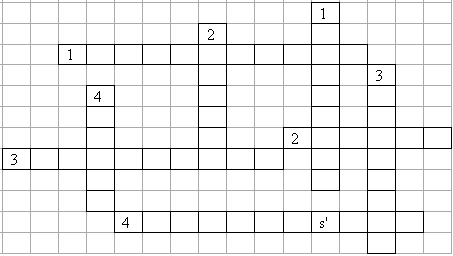
Across:
1. I always forget your wedding …
2. December 26th is called …. day.
3. The day Christ was crucified (распят). (2 words)
4. The day when many people promise to try and better themselves by, for example, giving up smoking. (3 words)
Down:
1. British people call April 1st …s' Day. (2 words)
2. Most people like to relax at the …
3. A time in Britain when people buy a lot of presents.
4. The day of the week when people go to church.
Кроссворд для проверки
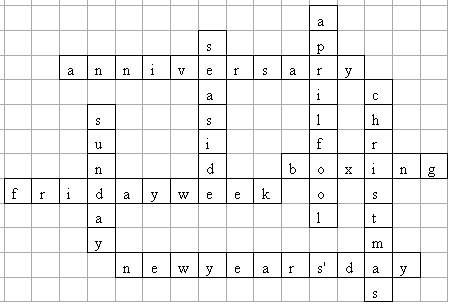
IX. Показ и презентация слайдов. Защита презентаций
– Two students have prepared presentations devoted to holidays. Let us look at them and put value of them.
X. Итог урока
– Let’s make a conclusion. What have you learnt today?
– Was the lesson interesting for you?
Выставление оценок за урок.
XI. Домашнее задание
– To write a letter to your friend about this lesson.
– Thank you for collaboration.
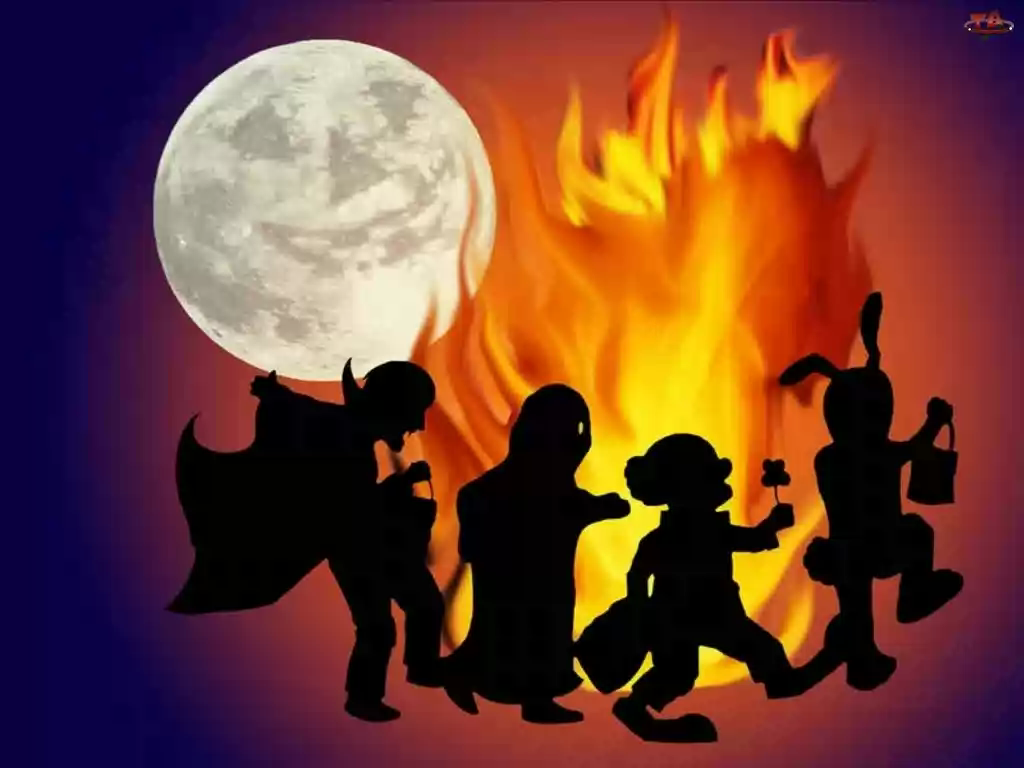
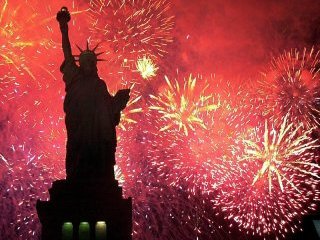
Праздники в англоговорящих странах
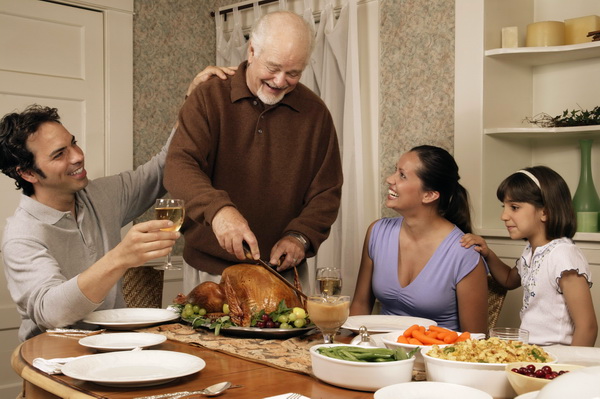

 Получите свидетельство
Получите свидетельство Вход
Вход


















 Конспект урока по английскому языку "Праздники в англоговорящих странах" (1.36 MB)
Конспект урока по английскому языку "Праздники в англоговорящих странах" (1.36 MB)
 1
1 1343
1343 212
212 Нравится
0
Нравится
0


